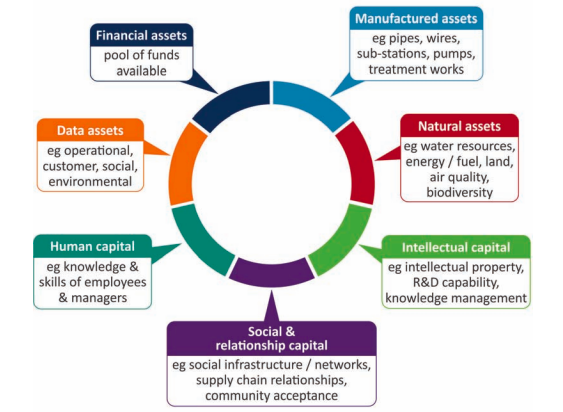On 26 March, Sustainability First hosted the second workshop of our Fair for the Future project into delivering a 'Sustainable Licence to Operate' for the energy and water sectors. The workshop tested the second 'Pillar' of our Sustainable Licence to Operate strawman - Making the best use of 'capital': collaboration and competition. It followed our initial March 2019 workshop on Pillar 1 of the strawman, Public purpose, philosophy, and public service values.

In our 'Sustainable Licence to Operate' strawman, we propose that companies develop a 'decision-making framework for thinking about competition and collaboration to make best use of capital'. Drawing on the International Integrated Reporting Council's (IIRC) definition, we use 'capital' to refer not only to financial assets but also natural, human, social/relationship, and intellectual capital, in addition to manufactured capital. We have added data assets to this list, in recognition of how data is transforming our lives. Our workshop focused on how water and energy companies might harness these different types of capital now and into the future, and particularly when and how competitive and collaborative approaches might be adopted.
In our initial discussions, attendees made the point that businesses needed to think as much about culture as they currently do about strategy when they consider how to make the best use of their different types of assets. In practice, this may mean embedding a culture that allows the forming of productive partnerships, which has perhaps received less attention than competitive approaches.
This led onto a panel discussion on the different types of 'capital'. Matt Dykes of the Trades Union Congress kicked things off with a presentation on people, often referred to as 'human capital'. He observed how utilities are crucial and unique industries in terms of their roles in relation to climate change and UK infrastructure, in addition to their provision of essential services or 'rights'. Crucially, workers ought therefore to be considered as 'dynamic partners' in the sectors, with people collaborating to play a fundamental part in the industries' mission and transition. Laura Sandys next presented on data as a collaborative form of capital that can be used as a tool to drive better outcomes, as exhibited in her work leading the Energy Data Taskforce's thinking on how data can be used as a predictive tool across organisational and sectoral siloes for the benefit of customers – including those in vulnerable circumstances. Peter Atherton, an Associate with Sustainability First, observed the need to prioritise between different types of capital and the need to recognise utility companies' finance capital as, ultimately, the 'accumulated savings of society'.
In the subsequent audience discussion, some attendees felt that when adopting the types of 'capital' identified by Sustainability First, they should do so as 'stewards' and not as 'owners', especially with regard to 'social' and environmental assets. A majority of attendees also suggested that company reporting is not yet sufficient against the different types of capital, and particularly that companies are not yet paying attention to data to the degree that they might.
A panel discussion led by former Eversheds Sutherland competition law partner Adam Collinson also resulted in a number of significant insights when it comes to competition and collaboration. Adam started the conversation by noting some of the perceived barriers to collaboration faced by companies in the sector, including:
- The design of regulatory frameworks, particularly for monopolies, around comparative competition;
- Encouragement of the development of competition for markets;
- The treatment of energy and water companies as discrete units rather than component parts of systems;
- The culture (and attitude towards risk) of some companies operating in the two sectors;
- Practical (management / control) challenges; and
- Fear of falling foul of competition law.
Simon Hughes of Portsmouth Water and Richard Walsh of Cadent then took attendees through their respective companies' innovative collaborative projects: in Portsmouth's case, the Havant Thicket Reservoir project, a collaboration with Southern Water; and for Cadent, the HyNet and HyDeploy projects. Both representatives stressed the importance of regional and long-term planning to their projects, and both made reference to the 'burning platform' that made such innovation necessary: for Havant Thicket, the impact water companies recognise their extraction is having on internationally important areas like chalk streams; and for HyNet and HyDeploy, the national challenge of decarbonising transport and heat. Alena Kozakova from Ofwat concluded the panel discussion by making the point that competition and collaboration are not polar opposites or binary choices, but rather that it is the regulator's role to promote both.Acknowledging that competition has more often been the focus of regulators, she suggested the possible need for a clear framework for collaboration, which may lead to greater levels of trust between companies and regulators.
The workshop next featured a case study highlighting innovative collaboration in the customer vulnerability space from the Thriving Communities Partnership in Australia, a cross-sectoral partnership bringing together a broad range of organisations to tackle common problems faced by customers in hardship and vulnerable circumstances. We will shortly be making available on our website a video highlighting the work carried out by the Thriving Communities Partnership, as well as an accompanying case study note.
This was followed by a breakout session led by Ed Mayo, Secretary General of Co-operatives UK, on different business models. Ed stressed the importance of institutionalising collaboration and overcoming siloed working. Co-operation and co-operative industries can act as a means of achieving this, especially in the utilities sector. For example, Rural electricity co-ops employ around 58,000 people in the US on a non- profit basis, around 260 telephone co-ops provide services for around 1.2 million rural Americans, and the Independent Networks Cooperative Association has helped to shape recent UK policy for its members. Ed also noted the importance of shared values to institutionalising collaboration, a theme echoed by Sustainability First in Pillar 1 of our Sustainable Licence to Operate.
Following Ed's talk, attendees were asked to take on the role of 'CEO for the day' for incumbent and new entrant utility companies respectively and posed a question of how their business models may need to adapt to deliver long-term public interest outcomes and make their companies 'fit for the future'. Both groups considered their proposed purpose and strategy, and especially how these related to the role of the regulator: the 'incumbents' would ask if their business's purpose was driven by the regulator and how they might think of going 'beyond' this; the 'new entrants' sought to 'make the regulator irrelevant' by means of proactivity and innovation.
Rounding off the day, participants noted that it is easier to think about the different types of capital in silos, but it is better to think about capital in terms of whole systems. While conversations about collaboration are difficult ones to have with boards, who are often results-oriented, concerns about customer and regulation do tend to achieve purchase at board level. Some companies are trying to go beyond this approach to talk about citizen and civic responsibility, but they have to build from what the board already understands and where there is already traction. Finally, it was felt the sustainability agenda needs to be instilled in a way that replicates the successful instilling of the safety agenda within companies. Boards recognise most the elements of governance, strategy, and risk; these could be ways in to frame discussions about sustainability and collaboration. These suggestions are being taken on board by Sustainability First and will inform the second round of our bilateral discussions with companies attempting to turn 'Talk into Action'.

